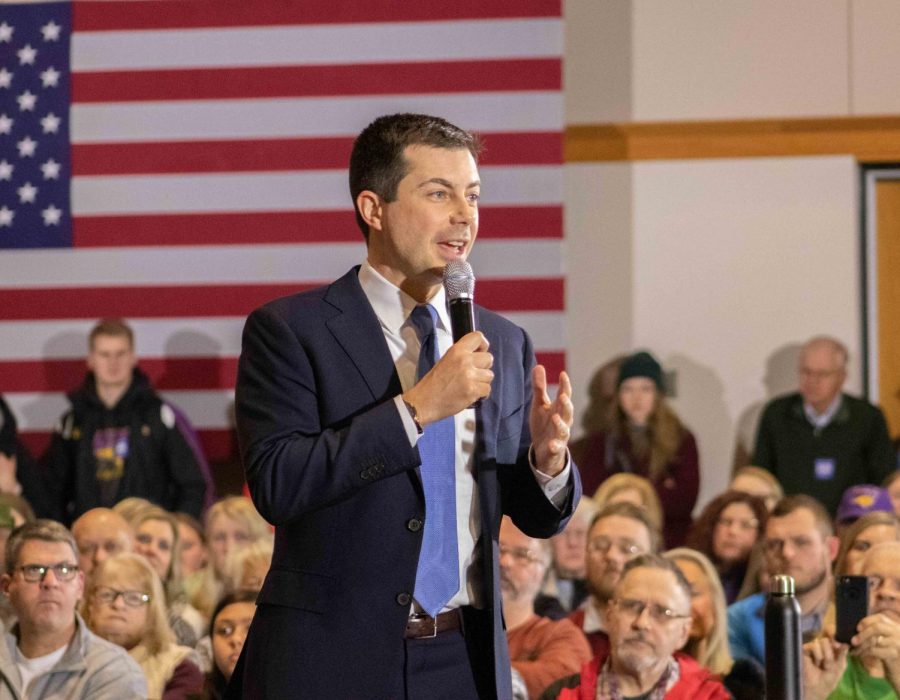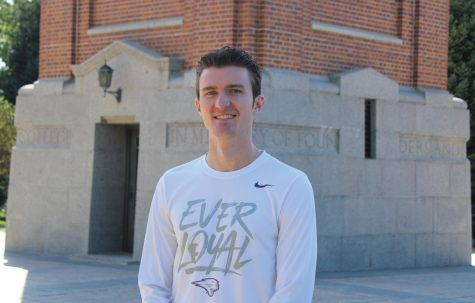Values might prove obstacle for Dems in 2020
Sports Editor Colin Horning discusses the decisions Democrats must make regarding the upcoming 2020 elections. He says the biggest obstacle is deciding between political ideologies within the Democratic party. South Bend Mayor Pete Buttigieg (above) and former Vice President Joe Biden are described as left-of-center, whereas Senators Elizabeth Warren and Bernie Sanders are described as falling towards the far-left.
Jan 30, 2020
Living in Iowa during a presidential election year means that escaping the relentless barrage of political content is virtually impossible. We’re constantly bombarded with advertisements from a seemingly countless number of politicians running for office, all giving us their time, attention and money for a few months until after the caucuses are done. This election year’s Democratic primary had a record 25 different candidates throw their name in the ring at some point, but coming into the final stretch until the Iowa caucuses, there are really only a small handful of remaining contenders, many of which have drastically different visions for the future of the Democrat party. We might not realize it, but this year’s caucuses will play a massively important role in the direction this party decides to go.
Most people by now are aware of the main frontrunners for the Democratic nomination: former Vice President Joe Biden, Vermont Senator Bernie Sanders, Massachusetts Senator Elizabeth Warren and former mayor of South Bend, Ind., Pete Buttigieg. Recent aggregate polls from RealClearPolitics, FiveThirtyEight and other polling data websites show that these four are the frontrunners in Iowa. Most polls have Sanders with a slight lead, followed by Biden, Buttigieg and Warren, respectively. But these four candidates, while all are seeking the nomination for the same party, are split down the line in terms of the wing of the Democrat party they represent. Biden and Mayor Pete are both branding themselves as moderate, left-of-center Democrats who can win back the Rust Belt and Midwestern states (Pennsylvania, Wisconsin, Michigan and Iowa) that handed Trump his victory back in 2016. Warren and Sanders, however, represent the branch of the modern Democrat party that want to move party policy drastically to the left. They champion policies such as cancelling all student debt, “Medicare For All” and massive tax hikes on the wealthiest individuals in America. Regardless of one’s own opinion on these policies, they undeniably are much further to the left than most typical ideas that have stemmed from the Democrat party in the past.
What these polls show is that most Iowa Democrats simply aren’t set on who they want to see become the nominee or the direction of the future of their party. Should Sanders win Iowa and New Hampshire (states he is currently leading in), it will only build his momentum further into Super Tuesday and primary season. Biden, on the other hand, is leading in South Carolina and Nevada (the third and fourth respective states to hold primaries), meaning that this primary season could become a dogfight between the moderate, old-fashioned Democrats and the new-age, far-left branch of the party.
This is why the Iowa caucuses have become so important. While Sanders is currently leading in our state, a victory from Biden could propel his campaign in various other states throughout the region and the nation. Even if someone like Senator Amy Klobuchar or Buttigieg finishes in second or third place in Iowa, it could still jumpstart their campaigns going into the rest of the primaries. But Iowa Democrats have a massive decision to make: whomever they decide to win here will likely decide whether the Democrat party will stay in a more moderate, working-class appeal or if it will take a drastic shift to the left on virtually every aspect of policy within the party.
The eventual Democrat nominee, whomever it winds up becoming, will also likely have trouble appealing to both sectors of the modern party. A candidate like Joe Biden definitely will appeal to the older, more centrist demographic of the Democrats, but will very likely struggle to appeal to the younger, more energized group of college-aged and millennial voters. However, nominating Sanders could easily mobilize this group of young voters, but his far-left policies will surely be off-putting to a lot of moderate Democrats who don’t want to see their party move in that direction.
Whether it winds up being Biden, Sanders, Warren, Mayor Pete or even Mike Bloomberg, the current ideological divide in the modern-day Democratic party might be too much of an obstacle for them to overcome. Until the Democrats themselves can agree on a direction for the future of the party and unite, they will have a difficult time winning back the White House in 2020.


















